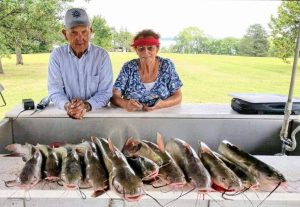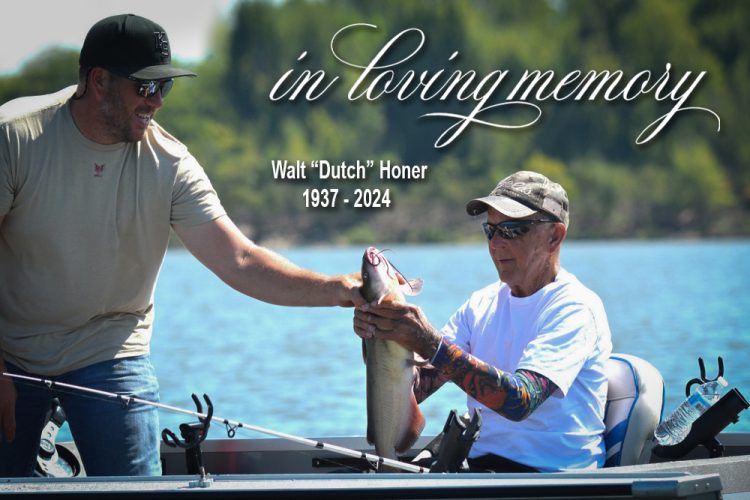Sean Honer (left) helped his granddad Dutch land a channel catfish
at Council Grove Reservoir in east-central Kansas.
Family Tradition: Camping & Fishing at Council Grove
Story and photos by Brent Frazee
Four generations of family bond at a Kansas reservoir.
As Walt “Dutch” Honer lays in a hospital bed, convalescing from complications from Parkinson’s Disease, one thing inspires him to hold on. He wants to go fishing again. And he wants his family at his side when he does.
“That’s the first thing I want to do when I get out of here,” said Honer, 87, of Wichita, Kansas.
For Dutch and Kay, his wife of 68 years, frequent trips to Council Grove Reservoir in east-central Kansas have been a major part of their life together.
They’ve come a long way since they met. “She lived across the street from me,” Dutch said. “I used to throw rocks at her to keep her on her side of the street.”

They’ve built a wonderful life on that rocky foundation. They’ve raised a family in the outdoors and have always turned to the healing power of the lake when times got tough.
Kay claims that Dutch has more lives than a cat, and no one argues. He has survived cancer surgeries, a boating accident, problems with Parkinson’s and the latest, a fall in which he hit his head. But those health problems haven’t robbed him of a life well-spent in the outdoors.
Dutch discovered the beauty of the Kansas Flint Hills in the 1950s when he joined co-workers on a fishing trip to Council Grove City Lake. They fished from the dam and caught stringers full of channel catfish.
“They weren’t huge, but we caught a lot of fish,” Dutch recalled.
When Dutch married Kay in 1956, he gained a camping and fishing partner. They started by spending weekends at Marion Reservoir, but moved to Council Grove when the 3,235-acre reservoir opened in 1965. It wasn’t long before they were joined by family and friends on their outings.
“We would fill a cove up,” Kay said. “We had a little village out there.
“We had trailers and motorhomes and everyone had a boat. Sometimes, we had 40 to 50 people out there.”
That tradition grew to the point where four generations of the Honers took part. They would camp, boat, waterski and relax at the water’s edge. But fishing was always the main activity.
The Honers started the day by throwing cast nets to catch shad. Then they would hit the lake for a day of drift fishing for channel catfish. They would use rigs that consist of a bell sinker above a swivel, with a section of leader trailing behind. That way, the shad they had threaded on a hook would twist as it trailed behind the boat, attracting the attention of hungry channel catfish.
They would fish during the day, then take a break, and would often go again at night. One by one, family members would inherit the Honers’ love for the outdoors.
“I remember when we had Sean, our grandson, out with us on the boat when he was only 9 or 10,” Kay said. “We went in the evening and just planned on fishing for a couple hours.

“But we started catching big channel cats along the shoreline, and we just stayed out. We didn’t get off the water until daylight the next day. He was a trooper. He just loved to fish.”
He still does. So do his two sons, Caden, 17, and Casten, 13. They too have followed in great-grandpa’s footsteps and love to chase channel cats.
A day’s catch was put to good use. The Honers would clean the channel catfish they caught, then they would host a lakeside fish fry for family and friends.
They became regulars at the Marina Cove campground, and they developed lasting friendships. Ginger Taunton, who along with her brother Skip and sister-in-law Lori own the marina, were among those who adopted the Honers as family. So did Ginger’s husband, Phil, a constant advocate for the virtues of family fishing.
When he and Ginger heard of Dutch’s latest health problems, they decided to catch a catfish in honor of their friend. Ginger took care of the bait, catching several bluegills. Phil threaded one of the panfish on a hook and cast it off the couple’s dock on Council Grove City Lake.
It wasn’t long before the pole bent sharply and a big fish began peeling of drag. A short time later, Taunton had a 40-pound flathead catfish in a landing net. Then, they visited Dutch in the hospital to relate their latest fish story.
“Dutch and Kay are part of our marina family,” Ginger said. “They’re just special people.”
Now the family and friends wait in hopes that Dutch will recover to the point where he can return to the lake with his family.
“It’s sad, but we have no regrets,” Sean said. “We’ve had a great life.
“As a kid, you don’t realize how fortunate you are to spent time at the lake with family. But the older I’ve gotten, I look back and realize that we were living the dream.”
(Brent Frazee is an award-wining freelance writer and photographer who lives on a lake in a suburb of Kansas City, Mo. He served as outdoors editor of The Kansas City Star for 36 years before retiring in 2016. He continues to write for magazines, websites and newspapers.)



